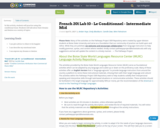
In this activity, students will say what they would do using the conditional tense in a variety of situations in a “choose your own adventure” style game.
- Subject:
- Arts and Humanities
- Languages
- Material Type:
- Activity/Lab
- Date Added:
- 11/21/2019

In this activity, students will say what they would do using the conditional tense in a variety of situations in a “choose your own adventure” style game.
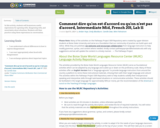
In this activity, students will brainstorm useful expressions for agreeing with, disagreeing with, and uncertainty about situations. Students will then practice using these expressions in conversation.
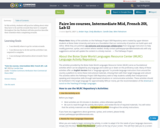
In this activity, students will practice talking about what they have to do and the errands they have to complete throughout the day. Students will also practice describe their schedule when completing errands.
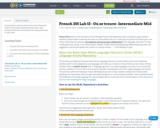
In this activity, students will practice describing their "ideal" French plaza. Students will also take a quiz relating to directions and will practice giving directions to each other.

In this activity, students practice introducing themselves to new people.
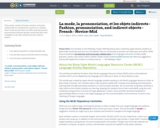
This activity consists of 3 mini-activities. In the first, students fill out a checklist for a partner in a "fashion show." In the second, there are videos and exercises for pronunciation between specific sounds that don't exist in English. In the third, students practice indirect objects.
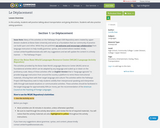
In this activity, students will practice talking about transportation and giving directions. Students will also practice asking questions
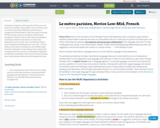
Comment naviguer le métro parisien? Have you ever been lost in another city, another country? How would you ask for directions? Would you know how to navigate the French Metro to get from point A to point B? This activity relates to the theme of directions, navigation. Students will use their prior knowledge of vocabulary related to this theme, as well as the imperative form of verbs. Also, most likely students have all experienced being lost in a new city - it is less likely now because of cell phones and satellite maps. However, taking the wrong subway train, going in the wrong direction in a street can still happen regardless of cell phone availability. This activity teaches students how to ask and give directions in the imperative form.

In this activity, students will practice talking about places and cities that they have visited. Students will also talk about what is currently going on in the world by planning a trip.

This activity has students practice their listening and comprehension skills. They will identify stereotypes from the target language and culture, and also practice describing themselves and someone they know (nationality, name, characteristics).

In this activity, students will practice accepting and/or rejecting formal invitations to an afternoon or evening together.